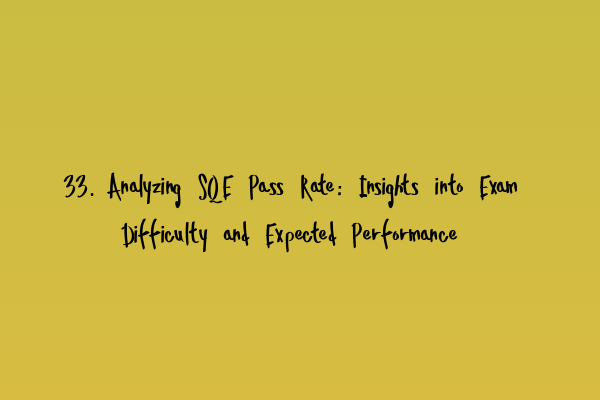33. Analyzing SQE Pass Rate: Insights into Exam Difficulty and Expected Performance
In the legal profession, the Solicitors Qualifying Examination (SQE) is a significant milestone. It serves as the gateway for aspiring solicitors to gain admission into the legal profession in England and Wales. Understandably, many law graduates and professionals are eager to gain insights into the exam difficulty and expected performance.
Today, we will delve deep into analyzing the SQE pass rate and explore the factors that contribute to the exam’s level of difficulty. By doing so, we hope to shed light on what candidates can expect and how they can prepare effectively.
1. What is the SQE Pass Rate?
The SQE pass rate refers to the percentage of candidates who pass the exam out of the total number of candidates who sit for it. This statistical indicator provides an overview of the exam’s level of difficulty and the performance expectations set by the Solicitors Regulation Authority (SRA).
2. Factors Influencing Exam Difficulty
a) Content Complexity: The SQE exams are designed to assess candidates’ knowledge and comprehension of various legal subjects. The complexity of the exam questions, as well as the depth of knowledge required, can contribute to the overall difficulty level.
b) Time Constraints: SQE exams are time-limited, meaning candidates must answer a set number of questions within a specified timeframe. The pressure of time constraints can significantly impact performance and increase the overall difficulty of the exam.
c) Assessment Methods: The SQE exams incorporate a variety of assessment methods, including multiple-choice questions, written tasks, and oral assessments. Each method presents its own challenges, making the overall exam more demanding.
3. Insights from SQE Pass Rate Analysis
Analyzing the SQE pass rate can provide valuable insights into the exam’s difficulty level and expected performance. By examining historical pass rates and identifying patterns, we can gain a better understanding of how candidates have fared in the past and anticipate future trends.
a) SQE 1 Pass Rate: SQE 1 assesses candidates’ legal knowledge and practical application skills. The pass rate for SQE 1 can indicate the level of difficulty associated with core legal subjects. It can also reflect the preparedness of candidates for this foundational exam.
b) SQE 2 Pass Rate: SQE 2 focuses on candidates’ ability to apply legal knowledge and skills to practical scenarios. The pass rate for SQE 2 can give insights into the level of difficulty associated with practical legal tasks and the effectiveness of preparation courses.
c) Regional Variances: Exam performance may vary by region due to various factors, such as the quality of legal education and access to resources. Identifying regional variances in pass rates can highlight areas that may require additional attention and support.
4. How to Prepare for the SQE Exams
a) Comprehensive Study Material: Accessing comprehensive study material, including textbooks, study guides, and practice questions, is crucial for a thorough understanding of the exam syllabus.
b) Mock Exams and Practice Questions: Practicing with SQE 1 practice exam questions and SQE 1 practice mocks FLK1 FLK2 can familiarize candidates with the exam format and improve their time management and problem-solving skills.
c) Preparation Courses: Enrolling in SQE 2 preparation courses and SQE 1 preparation courses can provide candidates with expert guidance, structured study plans, and personalized support. These courses help candidates develop a strategic approach to the exams and enhance their chances of success.
5. Stay Updated with SRA SQE Exam Dates
To ensure that you stay on top of important dates and deadlines, it is essential to be aware of the SRA SQE exam dates. This will allow you to plan your study schedule effectively and avoid any last-minute surprises. You can find a comprehensive list of the SRA SQE exam dates on our website.
In conclusion, analyzing the SQE pass rate can provide crucial insights into the difficulty level of the exam and expected performance. By understanding the factors that contribute to exam difficulty and preparing strategically, candidates can increase their chances of success. Remember to utilize comprehensive study material, practice with mock exams, and consider enrolling in preparation courses to maximize your potential.
For SQE 1 practice exam questions and SQE 1 practice mocks FLK1 FLK2, visit our related articles. If you are looking for SQE 2 preparation courses or SQE 1 preparation courses, we have you covered. Stay up to date with the latest SRA SQE exam dates to ensure a seamless and successful examination journey.
